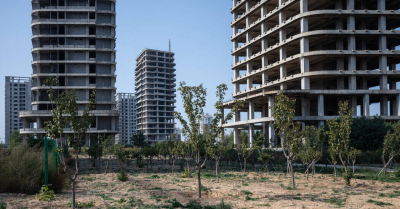纽约时报中文网 - 英文原版-英Chinas Banks and Property Sector Threaten a Growing Economy
November 7, 2023 4 min 712 words
这篇报道探讨了中国银行业和房地产行业对经济增长的威胁。这是一个复杂而重要的话题,涉及到中国经济的核心部分。中国的房地产市场一直备受关注,因为它在经济中发挥着巨大作用。然而,随着时间的推移,房地产泡沫可能会对经济稳定构成威胁。中国政府采取了多项政策措施来控制房地产市场,以防止出现崩溃。但这也可能会影响房地产行业的健康发展。此外,中国的银行业也面临风险,因为它们在支持房地产行业方面扮演着关键角色。银行不良贷款的增加可能会对整个经济造成不利影响。因此,中国政府需要在保持经济增长的同时,小心应对这些潜在风险。这篇报道提醒我们,中国的经济挑战不断演化,需要谨慎的政策和监管来确保经济的稳定和可持续增长。
The International Monetary Fund warned on Tuesday of risks posed by China’s financial and property sectors even as it took a more optimistic view on the country’s economic growth.
The I.MF. forecast that China’s economy will expand 5.4 percent this year and 4.6 percent in 2024. Each estimate was 0.4 percentage points higher than the fund had predicted four weeks earlier.
Gita Gopinath, the first deputy managing director of the fund, said at a news conference in Beijing that the changes reflected stronger economic performance than expected from July through September and recent efforts by Beijing to stimulate the economy. China said two weeks ago it would issue nearly $140 billion worth of bonds to pay for repairing damage from flooding last summer, as well as programs to improve the country’s resilience to climate change.
But Ms. Gopinath voiced worries about China’s housing sector, which faces falling prices and sales as well as loan defaults by leading developers.
“It’s very essential to deal with the issues in the property sector, which remains quite weak,” she said.
The fund released a summary of its annual assessment of the Chinese economy and financial system. It called for China to allow battered developers with no chance of turning themselves around to exit the industry. China has allowed developers that are effectively insolvent to stay in business, a practice that can impede the sector’s recovery.
Ms. Gopinath said that hopes earlier this year for a recovery in the housing market had already been thwarted by a second dip in the sector.
Zhang Qingsong, a deputy governor of China’s central bank, acknowledged at a financial conference in Hong Kong on Tuesday that the real estate sector had stumbled.
“We need to carefully manage its pace to avoid sharp downturns and unintended consequences,” Mr. Zhang said. “We have rolled out many measures to stabilize the property market.”
He called for China to find new ways to maintain economic growth. The state-controlled banking system has already ramped up lending for factory construction and other industrial investments.
“The old model of relying on investment and the real estate sector is no longer sustainable, that is why we must take a new approach,” he said.
In Beijing, the report by the I.M.F. raised the question of whether the banking system has enough financial reserves — a worry for investors as the country’s housing sector continues to deflate.
“Financial stability risks are elevated and still rising, as financial institutions have lower capital buffers and growing asset quality risks,” the fund wrote.
The visit by Ms. Gopinath and other senior fund officials to Beijing coincided with the release of a separate report on China’s extensive lending to developing countries.
That report, by the AidData institute at William and Mary, a university in Williamsburg, Va., found that China was making extensive rescue loans to developing countries that had borrowed from Beijing before the pandemic to pay for the construction of highways, rail lines and other infrastructure.
Wang Wenbin, a spokesman for China’s Ministry of Foreign Affairs, defended his country’s overseas lending while saying that he did not have specific information on the AidData report. “Reasonable debt is good for economic development,” he said at a briefing after the AidData report was released. “Many countries use government debt as an important means to raise financing and leverage for economic development.”
Also on Tuesday, China’s government said that exports fell 6.6 percent last month compared with October 2022. But half of that drop reflected a weakening of China’s currency, the renminbi, against the dollar.
Economists ascribe some of the slack in China’s exports to lackluster interest in manufactured goods by households around the world that stocked up on consumer electronics, furniture and other goods during the pandemic. China’s imports rose 3 percent last month from a year earlier when measured in dollars, and twice as much when measured in renminbi.
Olivia Wang contributed research.

